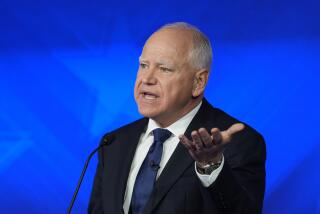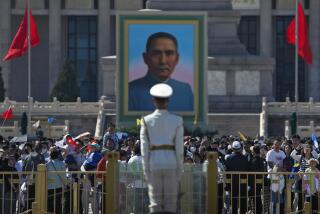China Says U.S. Activist Confesses to Lying : Asia: Supporters of jailed filmmaker Harry Wu doubt validity of claim.
- Share via
BEIJING — China claimed Thursday that American human rights activist Harry Wu has confessed to “deliberately falsifying facts” in documentaries he taped during clandestine trips to the country.
The official New China News Agency said Wu admitted that he and a British Broadcasting Corp. correspondent “cooked up the tapes,” which were used as the basis for exposes on prison labor camps and the sale of inmates’ organs for transplant.
A state-linked television production company also released a videotape--”See the Lies of Wu Hongda,” titled after Wu’s Chinese name--showing what purports to be Wu making his confession.
“When he was questioned by police, he confessed to having deliberately falsified the facts on the two videotapes,” the news agency said.
The United States expressed skepticism about the authenticity of the confession. “I would simply say this: It’s very difficult for us, watching television here in Washington, to determine what this tape is, who produced the tape, how it fell into the hands of commercial broadcasting companies for a price,” said State Department spokesman Nicholas Burns.
He said the United States will continue to press for Wu’s immediate release, calling it “a major case on the U.S.-Chinese agenda.”
But he added: “The United States and China must have a good relationship. . . . We’re making no threats here. We’re not making anything contingent on anything else.”
*
Wu, 58, a resident of Milpitas, Calif., has been detained since June 19. He was formally arrested July 8 in Wuhan in east-central China. He has been accused of espionage, a capital offense.
The black-and-white videotape released Thursday shows Wu being interrogated in a small room. Asked about two BBC documentaries on human rights abuses in Chinese prisons, Wu admits to intentionally falsifying information.
The prison labor documentary showed leather jackets, children’s clothes and other goods being sold outside a prison, and asserts the goods were made by inmates coerced into labor. The Chinese government denies the charges. In the videotape, Wu purportedly agrees that the documentary was “wrong” and “untrue.”
As for a BBC report on the sale of organs from executed prisoners to wealthy customers, Wu says that he “deceived people” but places much of the blame on the BBC.
“I made a phone call to the BBC and told them about the two wrong places,” he says, his head listing to the right.
Wu is then shown signing and dating a document, ostensibly his confession.
In London, the BBC said it stood by the documentaries, noting that Wu’s comments were made “clearly under duress during hostile cross-examination.”
Wu’s wife, Ching Lee Wu, told KRON-TV in San Francisco that she believes the man in the video is her husband but that she is not convinced his confession is genuine.
*
A Chinese government spokesman said charges against Wu will be formally announced after an investigation is completed.
Wu is allowed one consular visit a month and has been given writing materials and a list of lawyers to consult, said the U.S. Embassy in Beijing.
Though Wu’s own descriptions suggest he broke Chinese laws in his campaign to improve human rights in China--and was aware of the risks--his arrest has sparked an emotional reaction in the United States.
Barry Chang, founder and chairman of Silicon Valley for Democracy in China, which has been seeking Wu’s release, cast doubt on the taped confession. “He is under their control. I don’t believe he’s under his free will to speak,” Chang said. “All this information is Communist China propaganda.”
“Now we are seeing the desperate attempts of the Chinese government to smear Harry Wu’s reputation and to justify their illegal detention of him,” said Rep. Nancy Pelosi (D-San Francisco). “The U.S. must move quickly for [Wu’s] release.”
Secretary of State Warren Christopher and Chinese Foreign Minister Qian Qichen were expected to discuss Wu’s case, among other issues testing U.S.-China ties, at the Assn. of Southeast Asian Nations meeting in Brunei that starts this week.
Times staff writer Norman Kempster in Washington contributed to this report.
More to Read
Sign up for Essential California
The most important California stories and recommendations in your inbox every morning.
You may occasionally receive promotional content from the Los Angeles Times.









